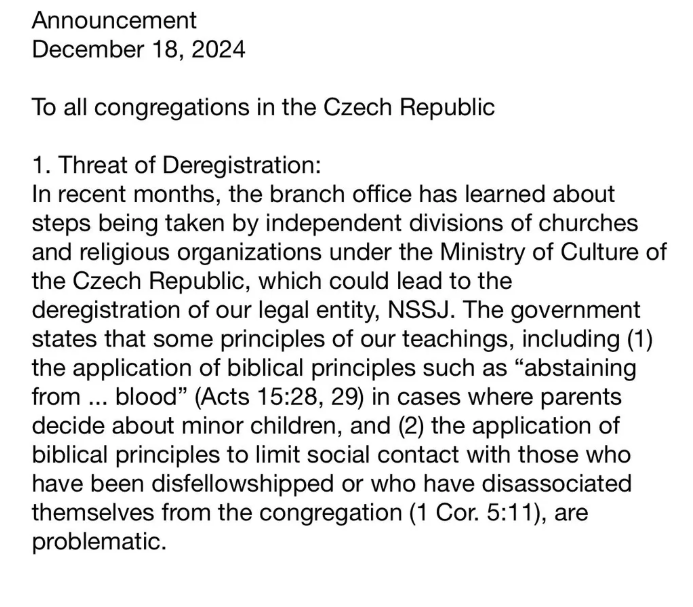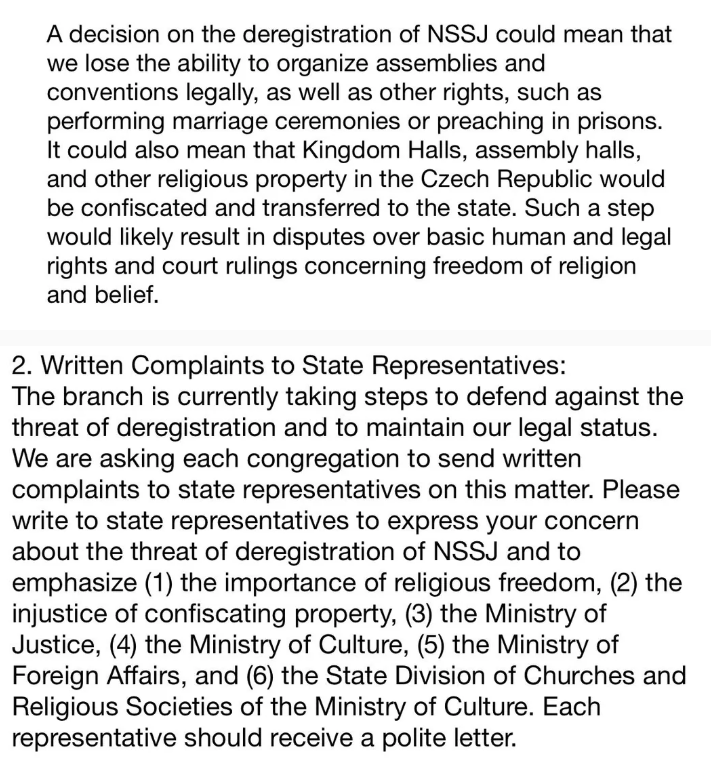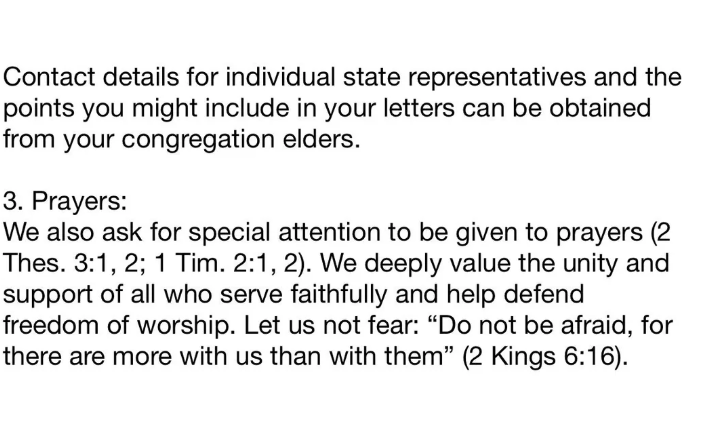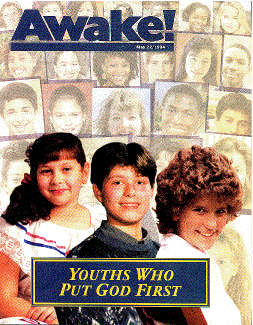More than 11 years revealing secrets because there is no excuse for secrecy in religion – w1997 June 1; Dan 2:47; Matt 10:26; Mark 4:22; Luke 12:2; Acts 4:19, 20.

Published by: Miss Usato on January 8th, 2025
Examining challenges regarding Blood Transfusions: How Jehovah’s Witnesses Face Legal, Tax, and Registration Debates Worldwide
It was in 1995, when the French government labeled Jehovah’s Witnesses as a dangerous sect, which led to heightened scrutiny of their activities and financial dealings. This designation stemmed from practices such as shunning (disfellowshipping, removing) and refusing blood transfusions. Four years later, in 1999, the French tax authorities demanded payment of back taxes on donations made to the organization between 1993 and 1996, totaling around €57.5 million. This demand arose from the refusal to grant the organization tax-exempt status, which is typically given to recognized religious associations. This was the first time the organization faced a challenge regarding jeopardizing their tax-exempt status. The matter pointed mainly on blood transfusions- Since then,
Russia – The issue of Jehovah’s Witnesses’ religious practices, including shunning and refusal of blood transfusions, has been at the forefront in Russia, where the government has labeled the group as an “extremist” organization, leading to legal actions and a nationwide ban.
Norway – This country has considered the issue in relation to the refusal of blood transfusions, particularly with regard to minors, and has dealt with the potential infringement of religious rights.
United States – Various states have dealt with cases related to Jehovah’s Witnesses’ refusal of blood transfusions, especially when minors are involved. There have been numerous court decisions addressing the rights of parents versus the medical needs of children.
Canada – Similar to the U.S., Canadian courts have addressed cases where Jehovah’s Witnesses’ refusal of blood transfusions has conflicted with child protection laws, particularly in situations where minors are at risk.
United Kingdom – The issue has been raised in both civil and family courts in the UK, particularly concerning minors and the refusal of medical treatment.
Australia – Australia has seen legal cases related to both blood transfusion refusal and shunning, particularly in relation to minors and family law
Italy – Italian courts have dealt with issues of blood transfusions, particularly in cases where minors are involved and parental rights to refuse treatment are tested.
Germany – In Germany, legal discussions have arisen in relation to the blood doctrine and the rights of minors, as well as the potential harm caused by the practice of shunning.
Other countries where similar legal debates have occurred include Poland, Denmark, Spain, Belgium, Finland, Austria, and the Netherlands. – and that is not all of them
Fast Forward- The Czech Republic and Jehovah’s Witnesses
December 2024, Jehovah’s Witnesses in the Czech Republic received a notice from NNSJ (The religious society of Jehovah’s Witnesses) expressing concern over potential de-registration by the Ministry of Culture. It is now 2025, and panic may ensue due to the fact that the Organization had just lost their registration in Norway, setting the guidelines on exposing such a Organization and their harmful practices. You can read a summary of the article on the Czech Republic here:
AvoidJW: Czech Jehovah’s Witnesses fear deregistration.
The main article:
Zdenek Vojtisek: Czech Jehovah’s Witnesses fear deregistration

In total, there are at least 15-20 countries where the practices of shunning and blood transfusion refusal by Jehovah’s Witnesses have been legally contested or discussed in the public sphere, particularly when these practices intersect with child protection laws, individual freedoms, or public health. These cases often involve careful balancing of religious freedoms with the protection of minors and medical rights.
The ministry cited two specific practices as grounds for this action:
Blood Transfusion Refusal: The application of the Bible principle of abstaining from blood in cases where parents make decisions regarding minor children.
Disfellowshipping: The application of the Bible principle of limiting social contact with those who have been disfellowshipped or who have disassociated themselves from the congregation.
Sound familiar?
The Religious Information Service is addressing the debate regarding the potential cancellation of the registration of the Religious Society of Jehovah’s Witnesses (NSSJ) under Section 22 of Act 3/2002 Coll. in the Czech Republic. To contribute constructively, it has initiated a series of articles focusing on key issues relevant to this matter. The articles address one of the two concerns raised in an NSSJ announcement from December 18, 2024: the restriction of contact with disfellowshipped individuals. The issue of blood transfusions for minors, while significant, is not discussed as it has seen no recent developments. Yet, the August 2024 Watchtower, guidance on interacting with disfellowshipped individuals was edited in December 2024 to soften language about potential interactions.
The series examines changing terminology within Jehovah’s Witnesses’ practices:
English translation of Czech branch letter to congregations concerning the government looking to deregister



January 6th, 2025 Zdenek Vojtisek: Jehovah’s WItnesses doctrine of Avoidance explains the Jehovah’s Witnesses attempt to galvanize supporters, including detailed complaints against their alleged exaggerations of potential outcomes. It also rebukes fears raised in the December article regarding confiscation of property, emphasizing procedural safeguards that would allow Witnesses to transfer assets before state intervention. The framing of the Jehovah’s Witnesses’ response to the Czech situation, arguing that their rhetoric (comparisons to Russian persecution) is misleading and unhelpful. It also highlights the implications of evolving language around shunning practices, setting the stage for further analysis of theological and historical contexts in future installments.
Seeing how many countries are recognizing the forms of abuse from this Organization, it would be interesting if the entire European Union will ultimately address this issue, acknowledging the abuse and harm caused by the Watchtower Bible and Tract Society, and revoking their charity status in countries where they continue to benefit from it.
Yet, someone in favor of the Organization, Massimo Introvigne wrote an article regarding this challenge: Czech Republic in the Footsteps of Russia? Jehovah’s Witnesses Threatened with Liquidation. Massimo is a self-styled ‘scholar’ whose work often aligns with the interests of groups facing widespread criticism. He frequently downplays legitimate concerns about harmful practices under the guise of defending religious freedom. His articles tend to cherry-pick information, presenting an overly sympathetic view of organizations accused of controversial behaviors. Some might say he acts less like an unbiased researcher and more like a PR representative for groups facing scrutiny. While his article highlights the potential for liquidation of the Czech Jehovah’s Witnesses under a law regulating religious freedom, it’s important to acknowledge the broader context of legal safeguards and societal concerns. The Czech Republic, as a member of the European Union, is not taking this step lightly. The Ministry of Culture’s actions are guided by concerns related to specific practices within the JW community that may potentially conflict with the country’s legal standards and human rights protections.
It’s crucial to recognize that religious freedom is not an absolute right without boundaries, especially when it intersects with other key values like the protection of minors and individuals’ autonomy. Practices like disfellowshipping and shunning could lead to harm, especially when they disproportionately affect children or vulnerable individuals, who may feel pressured to remain within a religious organization against their will. These practices raise concerns in many countries, not just in the Czech Republic, as they can affect individuals’ psychological well-being and social relationships, issues that need careful legal consideration.
I will add more to this article when updates occur regarding the Czech Republic and Jehovah’s Witnesses.




Aiding Transparency to Watchtowers teachings. If you have additional information about this topic or would like to reach the author- Please email [email protected]